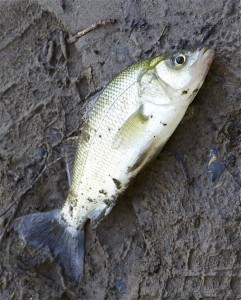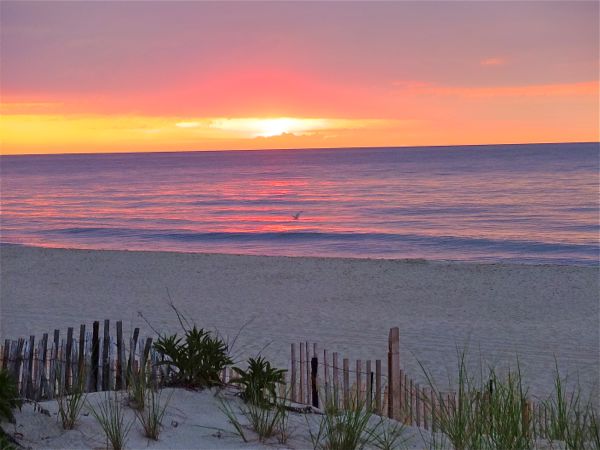Serious Threats Remain Unaddressed
On Monday (August 13) the NJ Senate and Assembly Environment Committees hold their annual summer joint hearing focused on the shore (at 10 am in the Lavallette First Aid Building, 1207 Bay Boulevard, Lavallette, NJ.)
The context for this year’s hearings is framed by another year of stinging jellyfish and growing threats of ecological collapse and harmful algae blooms in Barnegat Bay –
But far more serious problems lay buried beneath the radar.
Every now and then, a crisis provides a glimpse of the scope of those problems, which quickly fade in the 24 hour news cycle.
That is a radical departure from how things worked back in the day – like when rivers caught fire, politicians responded to public demands and passed the Clean Water Act.
For example, the recent Monmouth County water pipeline break was a perfect illustration of NJ’s multiple vulnerabilities to global warming – extreme weather, storm surge, sea level rise, coastal hazards, infrastructure, and climate change adaptation.
This week’s raw sewage discharge to the Hudson River from Tarrytown NY (my hometown) threatens the Iron Man competition – another high profile opportunity to focus on storm water management and “combined see overflows“.

Over-fishing, habitat loss, and pollution kill fish - not fisheries management and protective catch limits.
And the Star Ledger ran a page one story on the decline of NJ’s recreational fishing, boating, and marinas – mistakenly attributing economic woes to fisheries management and catch limits designed to protect over-fishing (at a time when the NJ fisheries management program is collapsing – and the Food and Drug Administration is threatening to shut down NJ’s commercial shellfishing market
But the joint Legislative Committees will not focus on any of this – instead, their hearing agenda is very narrowly crafted.
One scientist, Dr. Michael Kennish from Rutgers – will be allowed to testify on Barnegat Bay.
The remained of the day’s testimony will be on the “floatables” issue.
I objected to this narrow scope and have requested that legislators expand the hearing agenda – here is my note to the Committee Chairs, Senator Smith and Assemblywoman Spencer:
Dear Chairpersons:
Dr. Kennish is the leading expert on the science of the Bay and will make a wonderful witness – but he is not an expert on the DEP regulatory policies, standards and programs, including Clean Water Act provisions that apply.
Accordingly, the testimony is too narrowly crafted and the public should be provided opportunity to weigh in – at least with 5 minute statements if time is a consideration.
I also am disappointed by the narrow scope on related ecosystem issues.
In 2008 legislation, the Legislature created a “Coastal and Ocean Protection Council” and expanded DEP’s organic powers to include “ecosystem based management” (EBM) (see P.L. 2007, Chapter 288:
see also this ENS article:
Gov. Christie has zeroed the budget of that Council and done nothing too implement EBM in relevant DEP land use and water resource programs.
It seems that hearing agenda should be broadened to provide oversight of these issues, including major climate change related issues such as ocean acidification, sea level rise, shore vulnerability and coastal hazard assessment, climate change adaptation planning, fisheries management, and overall ecosystem health.
When state policymakers are silent on these critical issues, the public is left in the dark and vulnerable to manipulation and misinformation (see this weeks’s Star ledger page one story on fishery catch limits for one example).
We also released a major Report on the Delaware Bayshore that would be of relevance, see:
PROTECTING THE DELAWARE BAY ENVIRONMENT:
AN ANALYSIS OF EXISTING PROGRAMS
AND PROTECTIONS TO IDENTIFY OPPORTUNITIES FOR ECOSYSTEM BASED MANAGEMENTThe hearing’s narrow focus on floatables also ignores the far larger issue of “combined sewer overflows” (CSO), which are again in the news given the Hudson River discharge in NY that threatens this weekend’s IronMan competition.
I fear that largely cosmetic beach cleanup programs – and ineffective and partisan organizations – will use this narrow hearing agenda to promote the ineffective status quo and their own self interests (see: Of Monster Algae Blooms and Monstrous Lies)
Wolfe



Bill: Once again you have hit the target head on. It has come to my attention that there has been a ‘slash and burn’ approach of the DEP towards the Coastal Management Program – the regulatory aspect of the program is alive and well following the administrations directive to ‘open the door’ to developers through waivers, and general permits. The planning component of the program has been in decline since the administration changed. Three program managers in less than a year, staff from 8 to 2 and then mixed with the WQMP folks to give the appearance of additional staff resources; and now a staff of 1 as there have been additional ‘transitions’. Basically, the climate change, BBSAMP, Ocean Planning – the science perspective and coordination role played by the planning program with other arms of the DEP, academia, ngo’s, public is gone. The DEP is focusing on regulations – or non-regulations. It will be interesting to see when the proposed rules roll out whether there will be any semblance of ‘coastal protection in there’ or has the DEP made the revisions so ‘seamless’ and user friendly that the protections are a matter of a check list for e-permits, permits by rule and GPs? Interesting that the folks in charge of LU Regulation are the same that helped implement the Site Remediation Permit Program out the door. Will there be training programs and directions for how to file a waiver request and how to make any project eligible for a permit by rule or GP – a word here, a word there. Is it any wonder that the topics you identified are not on the radar or up for disussion. Not even sure this administration understands coastal management – a shame since this is the 40th Anniversary Year of the CZMA. So what can can we look forward to: Marguaritaville year round on Atlantic City Beach, increased beach badge fees, less parking, RV’s on the Wildwood Beaches, oyster and striper poaching in the Delaware Bay, and my recent favorite – don’t worry about the sewage spill in the Hudson it will be diluted by the time it gets to NJ. I feel safe…might as well move inland and let sea level rise take its course.
Thanks for reminding the public that it’s their coast too. And that it stretches from the GW Bridge along the Hudson, down the Atlantic, around Cape May and back to Trenton …alot more than Barnegat Bay (which does need help and isn’t getting more than just some money and platitudes tossed at it). Where is the ‘comprehensive strategy for coastal management’ – heck, where’s the comprehensive strategy for BB? The Governor’s 10 point plan is 10 discreet projects – somebody roll them up – oh, can’t do it – don’t have a coastal program except on paper.
Pingback: WolfeNotes.com » Reach Out and Touch Someone
Pingback: WolfeNotes.com » Joint Joke Today
Pingback: WolfeNotes.com » Beach Access Debate Is Bullshit And A Diversion From Climate Change and Real Ocean and Coastal Issues